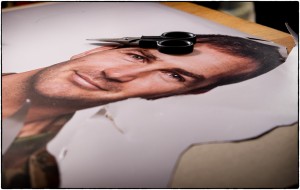
Louise D’Arcy’s short story ‘Flat Daddy’ has recently been made into a short film. Here, Louise chats with Spineless Wonder’s Irina Markovsky about this experience.
1. Which of your stories is being made into short film? How did this come about? Did you pitch the story or were you approached?
It’s Flat Daddy. It came about very serendipitously: the story was given to Trevor Holcomb, the son-in-law of a friend. He really liked and showed it to his brother, Matt. Matt and Trevor are commercial, music video and short film makers. They asked me for permission to make a film of the story. They applied for, and got, a grant from Screen NSW to turn Flat Daddy into a short (ten minute) film.
2. Did you write the script for the short film? If not, were you consulted, involved in any way during the writing of the script and in relation to the short film’s casting?
I didn’t write the script but I was consulted during the process and shown drafts of the screenplay for my comments. That was the extent of my involvement.
4. If the short film is finished, are there any differences between the short film and your story?
Yes, there are a couple of small changes to the plot. Also, they transferred the action from America to Australia (wish I’d thought of that!) but the essence of the story is the same. Some of the most unsatisfactory films/plays I’ve seen have been those that followed the original novel/short story too slavishly: a film is a different beast to the written word. I’m happy with how Flat Daddy made the evolution to film.
5. Why do you think this short story out of others was picked to be made into a short film? Are there particular elements in this short story, which will translate well into a short film?
Matt talked about this on local Lithgow radio where the film is shot:
He says he fell in love with the story, the combination of a family coping with absence and intro of a strange element (the cardboard cut out Flat Daddy).
6. When will the public be able to see the short film and where? Will it be possible to see it online, will there be a special screening arranged as an event?
Right now, the film has been entered in an international short film festival/competition. It will do the rounds overseas for the next couple of years. Hopefully after that, it will come back!
7. What are you working on next?
At the moment I am in the first draft of a novel and, as ever, have the odd short story on the go as well.
8. I heard Neil Geiman in an interview mention, when he was looking after his first baby, he would write from four am while his wife slept. Please describe your writing process. Do you have a unique writing routine? Do you take frequent breaks or write for prolonged periods of time?
I tried the Neil Gaiman technique, once – I couldn’t do it. I teach English as a Second Language full time, so writing is constantly squeezed and I am not nearly as strict with a routine as I could be.
9. There are more books available in bookshops written by men than women. Hence, the existence of the Stella Prize in Australia and what used to be till last year in England, the Orange prize. It is now called the Bailey’s Prize. Do you think there is a difference in what men and women write about or their writing styles that contribute to this or it is something else entirely?
This is a topic for a doctorate! I don’t buy into the (usually male) theory that women write differently or have different styles. Good writing isn’t gendered. Possibly men write more non-fiction than women.
10. Do you have any advice for people hoping to get published? Do you think doing Creative Writing courses at university level and short courses at state writers’ centre would be helpful?
The same advice everyone else gives: write and write and write. Rewrite and rewrite. Steel your heart and send your stories away. Brace yourself for their return, take a moment to recover, then send them away again. Repeat until it no longer hurts and then keep repeating. As for courses: you can teach people a lot but technique is not all, there has to be an innate spark there, too. It’s the difference between listening to a piece of music that is technically perfect but dead on the ear and a piece that might fluff a few notes but is warm and alive.
You can watch the trailer for ‘Flat Daddy’ here and you can listen to Louise reading her story here.
Purchase a copy of ‘Flat Daddy’ audio story, here.
Louise D’Arcy lives on a small property near Yackandandah, NE Victoria. She has been writing for 15 or so years and has had more than 30 stories published in journals and anthologies including Best Australian Stories, Sleepers Almanac and Overland. In 2009, she won the Albury City Library Short Story competition for the second time and in 2010 she won The Age Short Story Award. Louise has taught creative writing over the years and have tutored on Professional Writing and Editing courses. I currently teach a class on Memoir Writing at TAFE in Albury where I work (English as a Second Language teaching mostly).
